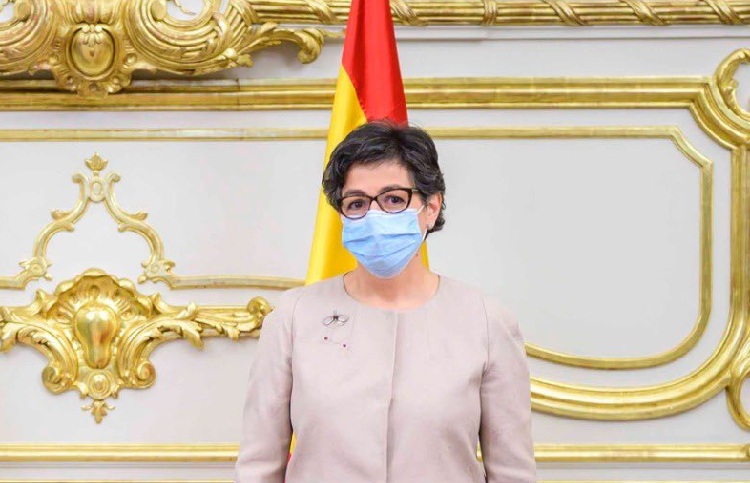Luis Ayllón
Concern has turned to astonishment and a certain unease. Spanish diplomats do not quite understand why the Minister of Foreign Affairs, Arancha González Laya, has still not appointed ambassadors, despite the fact that since before Christmas she has had on her desk the proposals presented by the group of senior officials in her Ministry in charge of selecting candidates from among the applicants.
In February, the Association of Spanish Diplomats (ADE), which groups 65 percent of the members of the diplomatic career, sent a letter to the undersecretary, Celsa Nuño, in which they expressed their surprise at the delay in appointments, something that affected those who will leave their posts, because as long as they had not requested approval for their successor, they could not apply for other posts abroad. In fact, many of them were unable to compete for this distribution, known in diplomatic jargon as the “bombo”, which was resolved on the 20th. The consequence is that, when they are dismissed, they will have to return to a post in Madrid.
The blockade has led to situations that are hard to understand in diplomatic circles. For example, the Spanish embassy in India has been vacant since its head, José Ramón Barañano, retired half a year ago, despite the fact that Spain has economic interests there, as evidenced by the fact that González Laya herself had recently planned to travel to New Delhi accompanied by a group of businessmen, a visit that she had to cancel due to the high incidence of the coronavirus in the Asian country.
Even more serious, according to diplomatic circles consulted by The Diplomat, is the fact that no ambassador has yet been appointed to London, a post that has been vacant since the dismissal on 2 February of Carlos Bastarreche, who retired at the end of November but agreed to stay on for a couple more months due to the UK’s exit from the EU on 31 December.
Despite the time available to the minister to appoint a new ambassador to London, this has not happened. According to The Diplomat, González Laya has already discarded, in these almost five months, up to half a dozen names of diplomats with extensive experience to fill the post, and has kept the “number two”, José María Fernández López de Turiso, as her Chargé d’Affaires.
The media consulted stress that the interlocution of a Chargé d’Affaires, however effective he may be, is not the same as that of an ambassador, especially at a time when the UK’s new relationship with Europe, and particularly with Spain, is taking shape, also marked by the Gibraltar dispute.
Moreover, not having unfilled ambassadorial vacancies for so long does not exactly give a very positive image in the countries of destination, as is the case in the UK, where the appointments of new ambassadors are always decided well in advance of the changeover. Thus, for example, the current British ambassador, Hugh Elliott, despite knowing Spain and the Spanish language very well, was appointed to the post in October 2018, to take up his post in August 2019.
According to the sources consulted, the minister has also received indications from the Prime Minister’s Office that she should begin to make decisions on the appointment of ambassadors. Apparently, González Laya wants to carefully study all the candidates that have been presented to her by the working group, but this is delaying the decision-making process enormously and causing concern and uncertainty among the candidates.
One of the factors that could be delaying decision-making is the minister’s desire for at least twenty of the new Spanish diplomatic representatives to be women, in an attempt to reduce the existing gap with respect to the number of male ambassadors, an objective that is part of the so-called feminist foreign policy, which she wants to be the hallmark of her time at the ministry.
Specifically, in addition to the embassies in New Delhi and London, the minister must fill the vacancies in Bosnia-Herzegovina, where the ambassador – osé María Valdemoro- also retired a month ago; and in Russia and Iran, where the incumbents -Fernando Valderrama and Luis Felipe Fernández de la Peña, respectively- will retire at the end of May.
She must also decide who will take charge of another 28 embassies, namely those of Canada, Israel, Greece, South Africa, Angola, Saudi Arabia, Ivory Coast, United Arab Emirates, Estonia, Gabon, Ghana, Guinea-Bissau, Haiti, Iraq, Afghanistan, Indonesia, Jordan, Kazakhstan, Kenya, Lebanon, Northern Macedonia, Mauritania, Nigeria, Paraguay, Dominican Republic, Slovak Republic, Thailand and the Permanent Representation to the EU’s Political and Security Committee in Brussels.
Around 140 diplomats, including a good number of Directors General and Assistant Directors General, are all awaiting appointment. The former, above all, have a good chance of making it, and this will mean that the minister will have to reshuffle her team.
But many other diplomats are also keeping an eye on the ambassadorial appointments, because they could aspire to other posts in the next ‘bombito’, in case some of those who have been appointed to a post in the ‘bombo’ are appointed ambassadors and leave their posts vacant.







